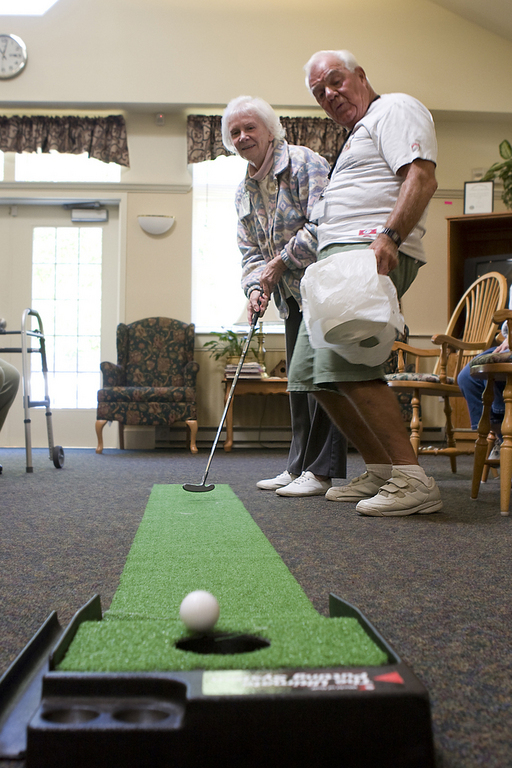
Linda Reynolds did not make the choice lightly. Her husband, Fred, had been struggling with Parkinson’s disease for several years, and she’d cared for him as his health deteriorated, affecting his mobility, his strength, his mental acuity.
He had to give up his driver’s license. Then one day she came home after work and he was lying on the floor. It wasn’t his first fall, but she could see his lunch still sitting on the counter. He was hospitalized, then went into rehab.
Reynolds had to decide: She could quit her job to stay home and care for him – and lose crucial income and health insurance – or she had to find an alternative. But a nursing home or assisted living “was out of the question.” Plus she adores him – he’s been “a wonderful husband to me for 18 years,” and she wants to care for him until she absolutely can’t anymore.
So every morning now, Reynolds drops her 77-year-old husband off at Cornerstone Adult Services in Warwick, one of 19 such facilities in Rhode Island, and he spends the day there. Every other Saturday, he goes to Cornerstone while she runs her errands.
To say Fred Reynolds likes this arrangement would be dishonest. But he accepts it as a reality of his life. Asked what he thinks of the center, he said in barely a whisper: “It’s fine … a lot of variety.” He added that “the people that work here are really excellent.”
Yet “after having freedom in my life,” he said, “having it cut off …”
This is the bittersweet world of adult day services, a relatively small and not very well-known segment of the long-term care system. You can think of them as very structured senior centers – there are communal meals, crafts programs, games, exercises – or as nursing homes where people spend just the day, then go home to their families.
Cornerstone charges $66 per day for its services, but reduces the rate to as little as $49 for low-income clients. Statewide, the average fee is about $67 (at that rate, a year’s care – six days a week for 50 weeks – would cost $20,100).
By comparison, assisted living cost an average of $37,716 last year, according to the MetLife Mature Market Institute; a private room in a nursing home cost $91,615; a visit by a skilled nurse costs about $110 per day, according to the National Association for Home Care & Hospice.
And while Medicare won’t pay for adult day services, there is Medicaid coverage, as well as extensive state subsidies. At Cornerstone – Rhode Island’s oldest and largest such agency, with four sites serving a total of about 250 people per year – about three-quarters of the clients are paid for at least in part by the state, said Roberta B. Merkle, president and CEO.
But qualifying for coverage is cumbersome and can take three to four weeks, far longer than for a nursing home, said Dottie Santagata, Cornerstone’s director of day services and social services. And yet adult day services, Merkle and others point out, are exactly the kind of long-term care option that policymakers agree should be supported and developed.
As people get old and frail, they need to get help somehow – they may not be able to walk well, or bathe, or go to the toilet. Or maybe they can do those things but can’t remember to take their pills, or prepare a meal for themselves.
To stay safe and healthy, then, those people need services in their homes or in the community. Adult day centers are one of the options, along with visiting nurses and home health aides.
First developed in the 1960s, adult day services follow two models: social, focused on activities and a safe environment; and health, which adds nursing care as needed.
In Rhode Island, by law and regulation, all facilities follow the health model and are required to have a nurse and certified nursing assistants on staff. That actually makes the centers that much more valuable, said Christine Sauro, director of Alternative Adult Care in Woonsocket and president of the Rhode Island Adult Day Services Association.
“We can give showers, help with toileting,” said Sauro. “We have nurses who give tube feedings, we give medications, we check diabetics’ blood sugar and give insulin … and provide a skilled level of care that you might see in a visiting nurse service or a nursing home.”
Sauro and Cornerstone’s Santagata also noted that even the social and recreational activities at the centers can be therapeutic. Arts and crafts projects help maintain fine-motor skills; games can stimulate participants’ memory; daily exercises can show whether a person can still follow directions, hold on to an object or lift a light weight.
Yet many people don’t even know these programs exist, Merkle and Sauro acknowledged. It’s one of the sector’s biggest challenges, along with funding – Rhode Island last year raised the daily Medicaid rate to $48, and it was the first raise in 10 years.
The small number of such programs – there are only about 3,500 adult day service centers nationwide – also means everyone currently in the field is a bit of a trailblazer.
Asked what they know about what constitutes quality in these programs, what are best practices, and what tangible results they produce, Merkle and Sauro both described how they carefully track their clients’ progress individually, and they noted that people in the field exchange lots of information and tips, but they acknowledged there is a lack of research.
People like Linda Reynolds, however, don’t need any studies to tell them how valuable adult day services are to herself and her husband.
“If he was home all the time, even if I was with him, I think he would go downhill,” she said. “He just wouldn’t have that connection with society.” •












